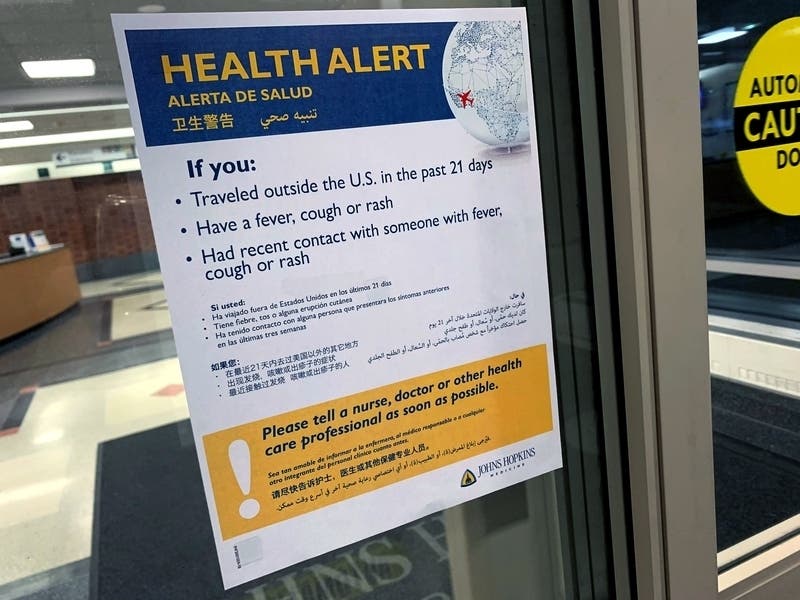Health & Fitness
Coronavirus May Be 'Community-Spread' In NJ
"Community-spread indicates that the coronavirus is amongst us," NJ's top health official announced as eight new cases were revealed.
NEW JERSEY – Two new cases indicate the coronavirus may be "community-spread" in New Jersey, traveling from person-to-person and not linked to any other cases or hot spots, officials said.
"Community-spread indicates that the coronavirus is amongst us and we have an expectation that that may be the case," Department of Health Commissioner Judith M. Persichilli said during a Wednesday press conference.
Persichilli did not say where the two specific cases are located. But she did they "did not have exposure to COVID-19, either a confirmed case of COVID-19 or traveled from an area that has had community spread of COVID-19."
Find out what's happening in Toms Riverwith free, real-time updates from Patch.
The two cases were among eight new ones identified in New Jersey on Wednesday. The state now has had 23 cases and 1 death; 37 people are under investigation. Read more: NJ Coronavirus Updates: Here's What You Need To Know
"Community spread is defined as person-to-person transmission without exposure to a confirmed case or a nexus to an area where community-spread is indentified," Persichilli said.
Find out what's happening in Toms Riverwith free, real-time updates from Patch.
Those cases that do not have a confirmed exposure, Persichilli said, will be placed under further investigation.
Persichilli said state health officials will be undertaking "mitigation strategies," such as restricting all outside activities and screening and restricting visitors at a North Jersey psychiatric facility.
She didn't identify the facility, only saying it is adjacent to two counties that have positive cases.
The eight new cases involve 4 people from Bergen County, 2 from Middlesex County and 2 from Monmouth County, said Persichilli. Of the 8 new cases, 3 are women and 5 are men. They range in age from 17 to 66.
Here is the press conference:
New Jersey Coronavirus Updates: Don't miss local and statewide announcements about novel coronavirus precautions. Sign up for Patch alerts and daily newsletters.
The new developments come as schools and colleges across the state continued to cancel classes, move classes online and prepare for an outbreak that could get worse. Read more: Coronavirus NJ School Closures: Here's The Latest (UPDATE)
Gov. Phil Murphy has declared a state of emergency, which allows his administration to expand its powers to treat the illness. Read more: NJ Gov. Murphy Declares State Of Emergency Because Of Coronavirus
State health officials have issued a long list of coronavirus outbreak guidelines for New Jersey schools and colleges now that the number of cases continues to climb in the United States and across the Garden State. Read more: NJ Issues New Coronavirus Guidelines For Schools, Colleges (UPDATE)
Some hospitals have also started visitation restrictions. Read more: Coronavirus Precautions: Southern Ocean Medical Restricts Visits
How It Spreads
The virus that causes COVID-19 is spreading from person-to-person. Someone who is actively sick with COVID-19 can spread the illness to others. That is why CDC recommends that these patients be isolated either in the hospital or at home (depending on how sick they are) until they are better and no longer pose a risk of infecting others.
There is currently no vaccine for COVID-19.
While the best way to prevent illness is to avoid virus exposure, the Centers for Disease Control and Prevention always recommends taking preventive actions to contain the spread of viruses. This includes:
- Avoid touching your eyes, nose, and mouth.
- Stay home when you are sick.
- Cover your cough or sneeze with a tissue, then throw the tissue in the trash.
- Clean and disinfect frequently touched objects and surfaces using a regular household cleaning spray or wipes.
- Wash your hands often with soap and water for at least 20 seconds, especially after going to the bathroom, before eating, after blowing your nose, coughing, or sneezing.
Get more local news delivered straight to your inbox. Sign up for free Patch newsletters and alerts.
